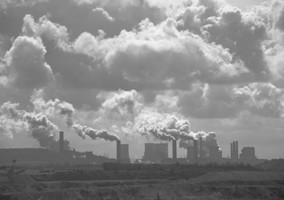“We are the first generation of charities to know we are destroying the world. And we could be the last that can do anything about it.”
It was no doubt a difficult year for Comic Relief, but despite most of the noise taken up with David Lammy and the ‘White Saviour’ debate, perhaps the most significant complaint was the fact that there is unnecessary use of plastic amongst its products, with the noses themselves coming under the most scrutiny.
A simple search through social media activity on ‘Comic Relief plastic’ brings up many stories of schools and others cricising the noses, often finding alternative ways to have a red nose, with paint being a favourite alternative. One headline in the Times ran “Comic Relief’s plastic red nose is now deemed toxic waste as millions end up in landfill - where they will never degrade”.
Perhaps it was just bad timing with the young people’s climate strike taking part on the same day, but ever since Blue Planet 2 was aired at the end of 2017, plastic usage has shot up the nation’s consciousness. Who would have thought a couple of years ago that we’d barely see a plastic straw in a pubs or that we’d all pack our shopping in re-usable bags. If society wants change, they want it quickly, even during the times of Brexit chaos.
This is rightly a growing concern in society, particularly for young people, so we can either carry on as we are, wait until we get criticism and react accordingly, or we can be proactive and take the lead on this issue in society, which is arguably what we should always do as a sector when society is threatened in such a way.
Why should we make it a priority?
Aren’t our own missions more important than this? Will we have time? Will I get buy in from the organisation? Won’t it be more expensive?
1) This is what young people care about most.
Young people are saying loud and clear that they see this as their most important issue. Maybe in the future, instead of people comparing our admin costs or CEO pay, we will be compared by our environmental impact. Those who don’t act now, might find they miss out on millennial donations in the future.
2) Climate destruction will drain the resources of society
Inevitably, the more we destroy the climate, the more of society’s resources will be prioritised to be spent dealing with the fallout. Money that may have been allocated to our own causes at both voluntary and statutory level.
3) If we don’t stop the destruction of the planet, there won’t be anything left.
And the doomsday response is that if we are truly on course to destroy our planet, why bother with our missions anyway?
And if the business case doesn’t snap us into action, the moral case should do. Just some stats from WWF below that we must stop.
- One in six species is at risk of extinction because of climate change.
- There could be more plastic in the sea than fish by 2050.
- Wildlife population sizes have plummeted by 60 per cent in under 50 years.
- We destroy an area of forest the size of a football pitch every two seconds.
- Food is a major driver of wildlife extinction. The food we eat in the UK alone is linked to the extinction of an estimated 33 species at home and abroad.
It’s time our sector stood up and showed young people all over the world that we are listening to their concerns and taking actions. In a very short time, we won’t be able to afford not to prioritise climate destruction, so the time to take action is now, as Comic Relief have already promised. Will the rest of us follow before it’s too late?
Russell Benson works for a UK charity. He is writing in a personal capacity.
|
Related articles












